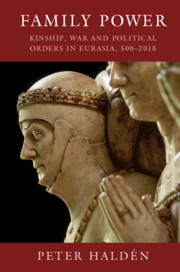Crossref Citations
This Book has been
cited by the following publications. This list is generated based on data provided by Crossref.
Lebow, Richard Ned
2020.
Durkheim et les Relations internationales.
Études internationales,
Vol. 50,
Issue. 2,
p.
221.
Jones, Doug
and
Biehl, Peter F.
2021.
Barbarigenesis and the collapse of complex societies: Rome and after.
PLOS ONE,
Vol. 16,
Issue. 9,
p.
e0254240.
Potts, D. T.
2022.
Agreeable News from Persia.
p.
1.
Yates, Douglas A.
2023.
The Palgrave Handbook of Diplomatic Thought and Practice in the Digital Age.
p.
265.
Hearn, Jonathan
2023.
Body, heart, mind and soul: power and personhood in an impersonal world.
Journal of Political Power,
Vol. 16,
Issue. 3,
p.
280.
Bruneau, Quentin
2023.
Rethinking International Order in Early Modern Europe: Evidence from Courtly Ceremonial.
International Organization,
Vol. 77,
Issue. 4,
p.
691.
Bruneau, Quentin
and
Vergerio, Claire
2024.
Three histories of the system of states.
International Politics,
Chen, Joy
Wang, Erik H.
and
Zhang, Xiaoming
2024.
From powerholders to stakeholders: State‐building with elite compensation in early medieval China.
American Journal of Political Science,
Kessler, Oliver
and
Leira, Halvard
2024.
Stories we live by: the rise of Historical IR and the move to concepts.
Cambridge Review of International Affairs,
Vol. 37,
Issue. 4,
p.
421.
Benz, Pierre
Araujo, Pedro
Legentilhomme, Geoffroy
Mach, André
Piguet, Steven
Strebel, Michael A.
and
Widmer, Emilie
2024.
The Swiss Patrician Families between Decline and Persistence: Power Positions and Kinship Ties (1890–1957).
Social Science History,
Vol. 48,
Issue. 2,
p.
331.



